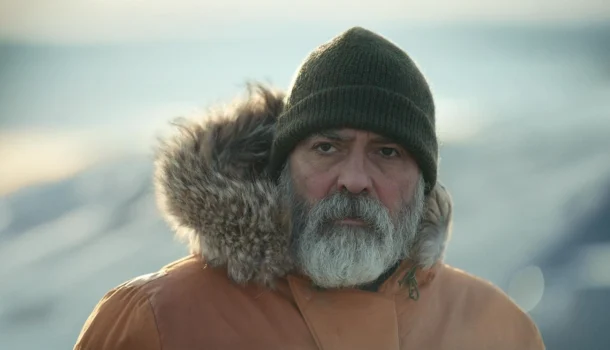In “The Midnight Sky”, George Clooney subverts expectations of space epics by grounding his narrative in the fragile thread of emotional survival. Inspired by Lily Brooks-Dalton’s novel, Clooney crafts a film that certainly carries the philosophical legacy of “2001: A Space Odyssey”, the isolating echoes of “Gravity”, and the metaphysical speculations of “Interstellar”. Yet it is in the weaving of Arctic ice with the last remnants of humanity aboard the Aether that he offers a singular experience — one that challenges the viewer to see collapse not as an isolated catastrophe, but as an inevitable mirror of our own collective negligence.
Augustine Lofthouse, portrayed by Clooney himself, is the ultimate antihero: a scientist whose clarity of mind shines brightest when lucidity has become a nearly obsolete luxury. On a planet consumed by an undefined calamity — a narrative intelligence that wisely avoids expository crutches — Lofthouse remains in an isolated station, not out of heroism, but driven by a mixture of guilt and resignation. Death looms on two fronts: through the decaying atmosphere and the illness silently consuming him. This juxtaposition of global destruction and personal decline gives the story a rare existential weight, handled with sobering restraint uncommon in the genre.
The unexpected appearance of Iris, a silent and enigmatic child, upends any expectation of total isolation. Her presence brings new urgency to Lofthouse’s mission — not merely to warn the Aether crew, but to reclaim the lost essence of human connection. Meanwhile, the astronauts — whose ignorance of Earth’s collapse creates a nearly unbearable tension — represent not only the hope of survival but also humanity’s final illusion of permanence.
Martin Ruhe’s visual construction is a symphony of contrasts. While the space sequences are technologically impressive, it is in the Arctic’s harshness that the film finds authenticity. The tactile relationship with the natural environment — far from digital excess — restores a dramatic urgency that transcends mere cold aesthetics. Here, suffering is tangible, and heroism becomes the simple act of enduring another day.
Still, “The Midnight Sky” does not emerge unscathed from its own ambitions. At times, narrative credibility stretches dangerously thin, such as when Lofthouse defies physiological plausibility by crossing a frozen lake. These departures, however, fall short of undermining the film’s emotional integrity. Instead, they reinforce Clooney’s commitment to a story whose backbone is not scientific accuracy, but the harrowing portrait of human stubbornness.
Alexandre Desplat’s score underscores this duality, shifting between brutality and tenderness, between endings and possible beginnings. With restrained direction and understated performance, Clooney allows each silence, glance, and minimal gesture to carry a weight that grand monologues could never match.
“The Midnight Sky” offers no easy redemption or comforting solutions. Its final breath is less a conclusion and more a disquieting invitation: to confront the vastness of our failure and, perhaps, the stubborn spark of our survival. In a world often eager to mask its ruins, Clooney chooses instead to expose them — unflinchingly.
Film: The Midnight Sky
Director: George Clooney
Year: 2020
Genres: Science Fiction / Drama / Thriller
Rating: 8/10

